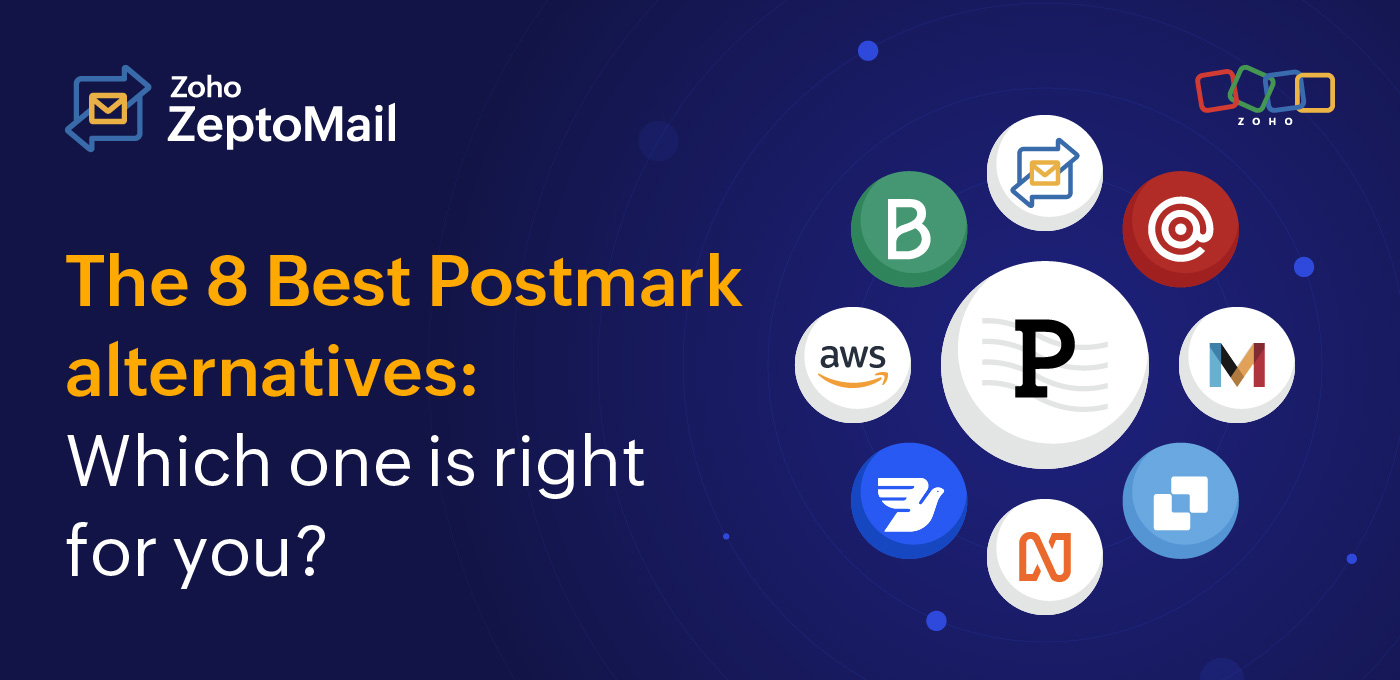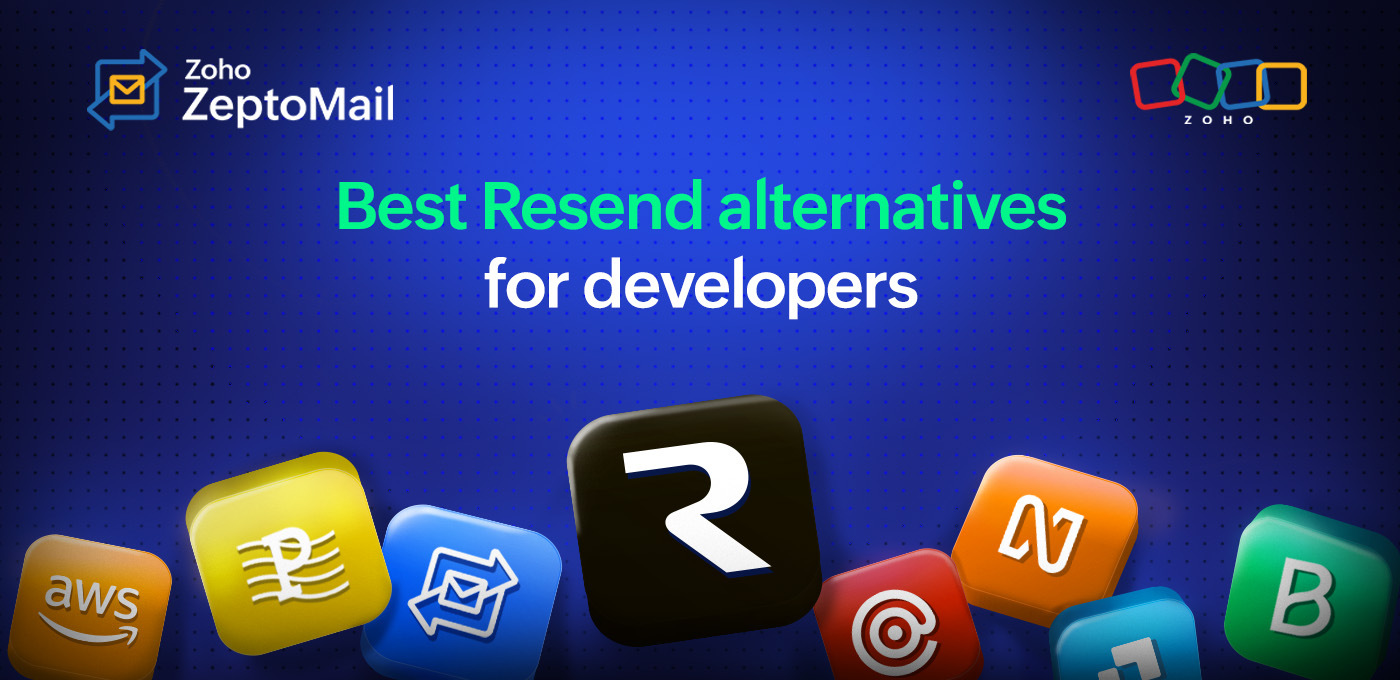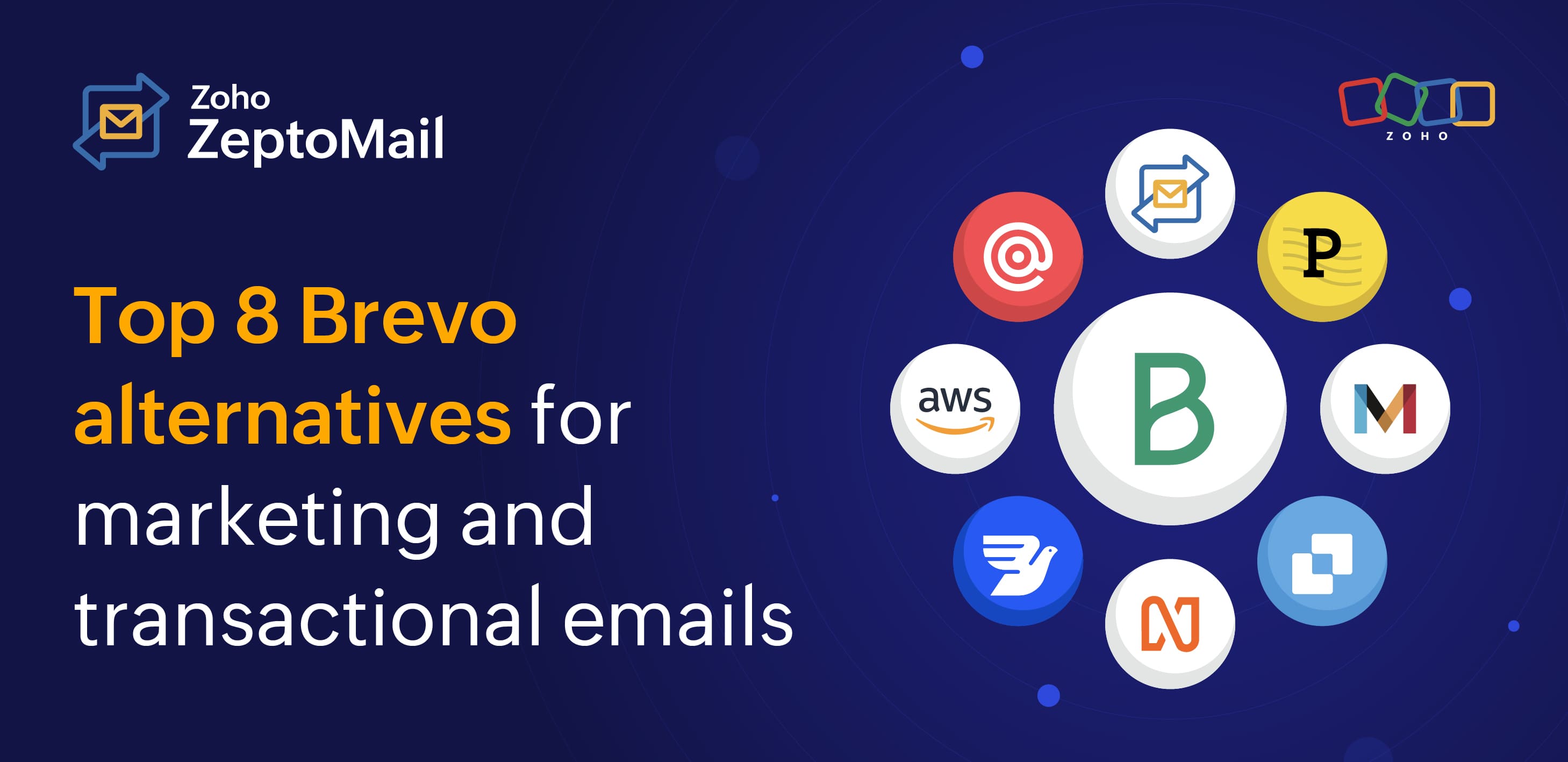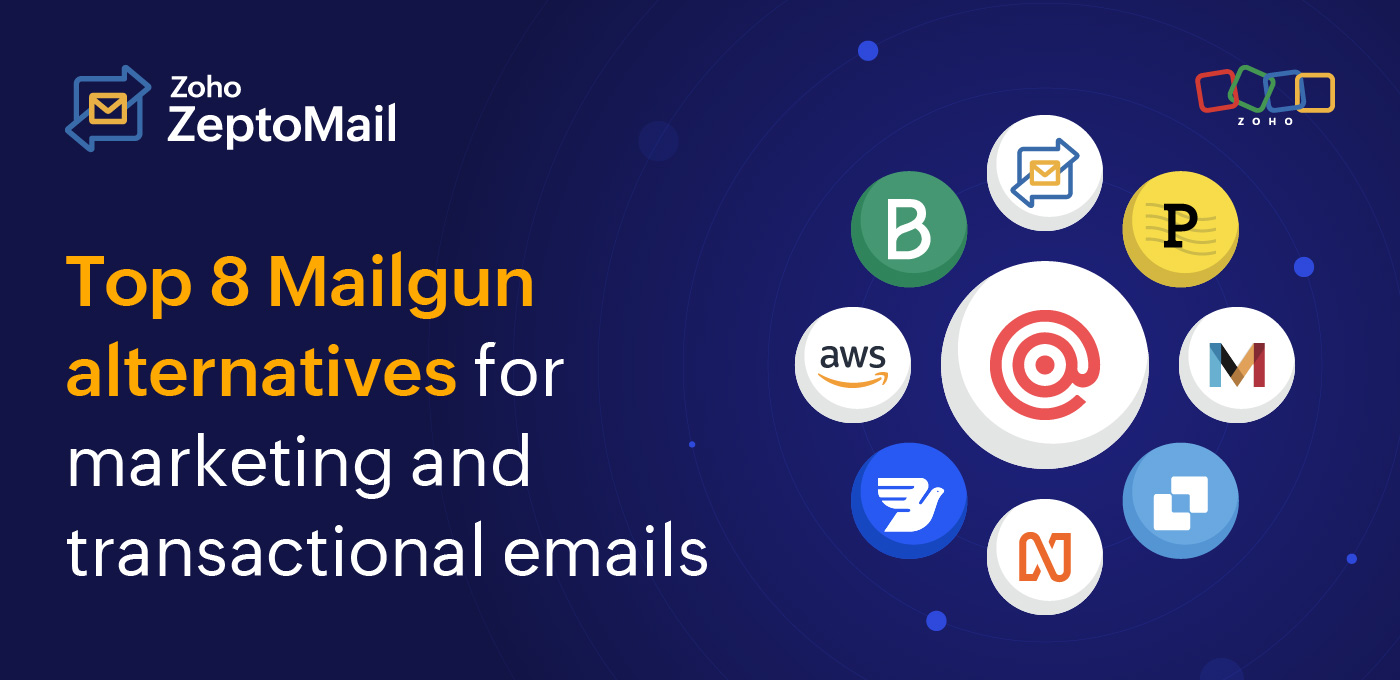- HOME
- Alternatives
- The top 8 Postmark alternatives
The top 8 Postmark alternatives
- Published : April 25, 2025
- Last Updated : December 9, 2025
- 746 Views
- 9 Min Read
Postmark has built a reputation for reliable transactional email delivery, but its recent pricing changes, as well as server and domain limitations, have left users searching for more budget-friendly alternatives.
So, if you're looking for a more cost-effective solution without compromising on features, you're in the right place.
We've compiled a list of the top 8 alternatives to Postmark that offer similar capabilities—without the hefty price tags or server and domain restrictions. Keep reading to find the best fit for your email-sending needs.

What is Postmark?
Postmark is an email service provider that can be used to send both marketing and transactional emails from your website or application. Postmark started off as a transactional email-only service, later expanding to support promotional and bulk email sending. Currently, Postmark focuses on delivering marketing and transactional emails with separate email streams for seamless email sending.
Why should you look for Postmark alternatives?
1. Higher pricing compared to its competitors
Many users find Postmark's pricing to be steep, especially as their email volume grows. Unused emails don’t roll over, making it less cost-effective. Compared to other popular transactional email platforms, Postmark remains on the higher end of the pricing spectrum.
2. Restricted servers and domains in the most popular plan
Many users have started looking for Postmark alternatives due to a sudden pricing change based on the number of servers and domains. Previously, there were no such restrictions, but now users requiring more than six servers and ten domains must upgrade to a higher-tier plan, leading to a significant cost increase.
3. Short-term data retention policy
Data storage is available for an extended period across all customer tiers. In contrast, Postmark retains activity data, email data, and content data for a much shorter timeframe, which could be a downside for users who may need to reference past data.
4. Limited features to handle bounces
Postmark offers limited bounce-handling features compared to other services. Effective bounce management is crucial for transactional emails because it directly impacts your sender reputation. This limitation may lead users to explore other alternatives.
What should you consider while choosing a Postmark alternative?
Next, let's look at things you need to look for in a transactional email service.
✅ Exclusively built for sending transactional emails
✅ Focuses on email deliverability
✅ Suitable for sending high volumes effortlessly
✅ Takes care of bounces with exclusive bounce reports
✅ Seamless integration with your website or application
✅ Takes compliance and privacy seriously
✅ Robust features to manage, segregate, and track
✅ Comprehensive analytics for data-driven decisions
✅ Pricing that aligns with your budget
✅ Support that actually listens and helps when you need it
The top 8 alternatives to Postmark
1. Zoho ZeptoMail
2. SendGrid
3. Mailgun
4. Mailchimp Transactional (formerly Mandrill)
5. Amazon SES
6. Brevo (formerly Sendinblue)
7. Bird (formerly Message Bird)
8. Netcore

Unlock a detailed feature comparison to choose the right transactional email service for your business.
View full comparison
1. Zoho ZeptoMail
ZeptoMail, introduced in 2020, is a specialized solution for sending transactional emails. Built with a dedicated infrastructure and advanced features, it optimizes email delivery, enhances reliability, and safeguards your sender reputation.
Area of specialization
Rapid delivery of transactional emails and bounce handling.
Who is it for?
It's an ideal solution for businesses of all sizes who want a secure and scalable transactional email service.
Pros
✅ Dedicated infrastructure: Exclusively for transactional emails, ensuring your sender reputation stays intact.
✅ Deeper integration: Supports SMTP and a robust API for effortless connectivity with apps, websites, and services.
✅ High-speed email delivery: Optimized protocols for rapid and reliable email transmission.
✅ No mandatory monthly plans: Enjoy a credit-based system with credits valid for six months.
✅ 24/7 free support: Reach out via email, chat, or phone anytime.
✅ Advanced email tracking: Monitor opens, clicks, bounces, and delivery performance in real time.
✅ Quick migration: Move from Postmark to ZeptoMail in just five minutes.
✅ Robust security: Two-factor authentication (2FA) and domain authentication to enhance email protection.
Cons
❌ Transactional emails only: ZeptoMail doesn't support promotional or marketing email campaigns.
Key features
- Mail agents: Categorize emails based on type, purpose, and application.
- Custom reports: Gain insights and compare performance across Mail Agents.
- Activity logs: Track user actions with logs to monitor all activities.
- IP restrictions: Send email securely with an authorized IP list.
- Data retention: Store email content for 60 days and activity logs for one year.
- Prebuilt templates: Get prebuilt email templates for transactional emails.
- Auto top-up: Automatically renew credits to avoid service disruptions.
- Suppression list: Block emails to addresses with hard bounces.
ZeptoMail pricing
- 1 Credit ($2.50) = 10,000 emails
- 30 Credits ($75) = 300,000 emails
- Free plan: Get 1 free credit (10,000 emails), valid for a month
2. SendGrid
SendGrid is a cloud-based email delivery platform that helps businesses send high volumes of transactional and marketing emails with ease. Acquired by Twilio in 2019, it offers a robust infrastructure, advanced API integrations, and scalable email solutions.
Area of specialization
It's ideal for managing large-scale email campaigns, maintaining email list hygiene, and optimizing deliverability.
Who is it for?
Mid-size to enterprise businesses and developers seeking a reliable and scalable email-sending solution.
Pros
✅ Highly scalable: Handles large email volumes efficiently, making it ideal for growing businesses.
✅ Developer-friendly API: Enables seamless integration with applications for customized email workflows
Cons
❌ Deliverability concerns: Sender reputation issues can impact email performance.
❌ Limited customer support: Lower-tier plans may experience slow response times.
❌ Complex pricing structure: Additional costs for dedicated IPs and other features may not be budget-friendly for small businesses.
Key features
- Advanced email analytics: Monitor open rates, clicks, bounces, and recipient engagement.
- Automated email workflows: Set up triggers, autoresponders, and automated campaigns.
- Prebuilt email templates: Access professionally designed templates for easy email creation.
Pricing
- Essentials plan: Starts at $19.95/month (50,000–100,000 emails)
- Pro plan: Starts at $89.95/month (100,000–2,500,000 emails)
- Premier plan: Custom pricing based on email volume and business needs.
3. Mailgun
Mailgun is a cloud-based email service provider designed for seamless transactional and marketing email delivery. Built specifically for developers, it offers a robust API for effortless integration with applications, websites, and services.
Area of specialization
Mailgun is optimized for handling high email volumes efficiently at scale.
Who is it for?
- Developers looking for a flexible and scalable email-sending solution.
- Enterprises managing large volumes of emails with advanced automation needs.
Pros
✅ User-friendly UI: Clean, intuitive interface for streamlined email management.
✅ Highly scalable: Easily expands to accommodate growing email volumes.
✅ Seamless API integration: Quickly integrates with applications for automated email workflows.
Cons
❌Complex setup: Requires technical expertise, making it less beginner-friendly.
❌Limited support on lower plans: Free and basic-tier users may experience slower response times.
❌ Deliverability comes at a cost: Advanced deliverability services are available only for senders with more than 500,000 emails per month.
Key features
- Blacklist and spam-trap monitoring: Improve deliverability and reduce bounce rates.
- Drag-and-drop email template builder: Create and customize professional emails with ease.
- Advanced email analytics: Gain deep insights into email engagement, open rates, and clicks.
Pricing
- Free plan: 30,000 emails free for the first month
- Basic plan: $15/month for 10,000 emails
- Foundation plan: $35/month for 50,000 emails
- Scale plan: $90/month for 100,000 emails
Additional optimization services start at $49/month.
4. Mailchimp Transactional
Mailchimp Transactional, formerly known as Mandrill, is a dedicated email service for sending automated marketing and transactional emails. However, transactional emails are available only as an add-on for existing Mailchimp users.
Area of specialization
Ideal for personalized email marketing, promotional emails, and automated transactional messages.
Who is it for?
- Businesses who already use Mailchimp for marketing emails.
- Organizations looking for a unified platform to manage both marketing and transactional emails.
Pros
✅ All-in-one marketing suite: Design, automate, and send marketing and transactional emails from a single platform.
✅ Get advanced analytics and insights: Get personalized reports, smart recommendations, and performance tracking.
Cons
❌High pricing for scaling businesses: Costs rise with email volume, making it expensive for startups and small businesses.
❌Limited to Mailchimp users: Transactional emails are only available as an add-on, requiring an active Mailchimp marketing plan.
Key features
- Detailed reporting and analytics: Monitor transactional email performance with real-time insights.
- Webhooks for real-time tracking: Track open rates, clicks, bounces, and unsubscribes.
- Drag-and-drop email template editor: Easily build and customize emails without coding.
Pricing
- $20/month: 10,000 emails (1 block) + Mailchimp marketing plan cost
- $40/month: 50,000 emails (2 blocks) + Mailchimp marketing plan cost
Blocks must be purchased monthly, and all emails (including unused ones) are billed.
5. Amazon SES
Amazon Simple Email Service (Amazon SES) is a cloud-based email solution from Amazon Web Services (AWS) that enables businesses to send and receive both transactional and marketing emails at scale.
Area of specialization
Designed for businesses that need a cost-effective and highly scalable solution for handling large email volumes.
Who is it for?
- Businesses of all sizes that are looking for an affordable email-sending solution.
- Developers and enterprises that need seamless website and application email integration.
Pros
✅ High email deliverability: Uses dedicated IP addresses and content filtering to optimize deliverability.
✅ Pay-as-you-go pricing: No monthly fee required. Pay only for what you use.
Cons
❌ Complex setup: Requires technical expertise, making it challenging for beginners.
❌ Basic features require add-ons: Needs additional AWS services like Amazon SNS for notifications, Amazon S3 for email storage, and Amazon IAM for user access management.
Key features
- Configuration sets: Organize and segment outbound email messages.
- Email suppression lists: Automatically and manually manage bounced and complaint-triggered emails.
- 24/7 customer support: Access around-the-clock assistance via email, phone, and chat.
Pricing
- $5.12 for 50,000 emails
Pricing varies based on selected features and usage.
6. Brevo
Brevo is a comprehensive marketing platform that combines email marketing, SMS marketing, CRM, and transactional email services, offering businesses an integrated solution for seamless communication and campaign management.
Area of specialization
Ideal for personalized email creation, marketing automation, and efficient campaign management.
Who is it for?
- Medium-sized businesses looking for an affordable, scalable marketing platform.
- Marketers and business owners who want to automate and streamline email and SMS campaigns.
Pros
✅ User-friendly interface: Intuitive UI makes it easy for beginners and experienced marketers to create and manage campaigns.
✅ All-in-one marketing solution: Combines email marketing, transactional emails, SMS campaigns, CRM, and automation tools in a single platform.
✅ Multichannel transactional emails: Send transactional messages via email, SMS, and WhatsApp.
Cons
❌ Limited focus on transactional email delivery: While Brevo offers multiple marketing tools, its infrastructure isn’t dedicated specifically to high-volume transactional emails.
❌ Restrictions on the free plan: Daily send limits and limited access to advanced features.
❌ Not ideal for large enterprises: Designed for SMBs, it may lack the advanced scalability and features required by large corporations.
Key features
- Drag-and-drop workflow builder: Easily create personalized email campaigns and automation workflows.
- Smart email segmentation: Organize and manage emails efficiently with folder-based segmentation.
- Advanced email analytics: Track open rates, bounces, clicks, and unsubscribes to optimize performance.
Pricing
- Starter plan: Begins at $9/month
- Business plan: Starts at $18/month
- Enterprise plan: Custom pricing for advanced needs
7. Bird
Bird is a powerful omnichannel communication platform that enables businesses to engage with customers seamlessly across multiple channels, including SMS, WhatsApp, email, voice, and more.
Area of specialization
Designed for customer engagement across multiple messaging channels, covering marketing, support, and automated notifications.
Who is it for?
- Businesses of all sizes that are looking for a unified communication platform.
- Companies seeking to streamline customer interactions across multiple channels.
Pros
✅ Omnichannel communication: Connect with customers via SMS, WhatsApp, Messenger, email, and voice from a single platform.
✅ Email automation: Set up workflows to automate transactional and marketing emails, improving engagement and conversions.
Cons
❌ Limited advanced analytics: Offers basic reporting but lacks in-depth insights and customization compared to competitors.
❌ Higher costs for high-volume email sending: Pricing scales with email volume, making it less budget-friendly for businesses with large email needs.
Key features
- Flow builder: Create automated workflows for notifications, marketing campaigns, and customer support. No coding is required.
- Campaign scheduling: Plan and schedule marketing campaigns for maximum audience engagement.
- Automated event-based notifications: Use APIs to trigger notifications based on customer interactions.
Pricing
- Starts at $45/month for 30,000 emails
Pricing is based on the number of contacts targeted monthly.
8. Netcore
Netcore Cloud is an advanced marketing automation platform that enables businesses to manage customer communication seamlessly across multiple channels, including email, SMS, push notifications, WhatsApp, and in-app messaging.
Area of specialization
Optimized for AI-powered email delivery, marketing automation, customer segmentation, and omnichannel engagement.
Who is it for?
Developers and businesses of all sizes who look for a scalable platform for transactional and marketing emails.
Enterprises looking for seamless API or SMTP email integration.
Pros
✅ Omnichannel communication: Engage customers via email, SMS, push notifications, WhatsApp, and in-app messaging.
✅ Scalable infrastructure: Handles high-volume messaging, making it ideal for mid-sized businesses and enterprises.
✅ Seamless integration: Easily connects with applications using SMTP or API.
Cons
❌ Customer support delays: Response times may be slow, causing issues during critical technical challenges.
❌ Limited free plan: Basic features are restricted, requiring businesses to upgrade for full capabilities.
Key features
- AI-powered email delivery: Uses AI-driven optimization to enhance inbox placement and engagement.
- Send time optimization: Delivers emails at the best possible time to maximize customer interaction.
Pricing
- Available plans: Startup, Growth, and Enterprise
Pricing is customized based on features and email volume—available upon request via a demo with the sales team.
Wrapping up
While Postmark is a reliable option for transactional emails, several Postmark alternatives provide the same level of deliverability, reliability, and features at a more cost-effective price. To choose the right transactional email service, assess your email sending volume, budget, and the essential features you need for seamless transactional email management.


